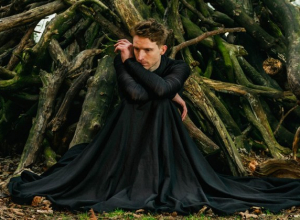Five ways struggling musicians can make money on lockdown
By Holly Mosley in Music / Festivals on 09 April 2020
Live musicians take a financial hit during the worst health crisis of a generation.
It's safe to say that live performances are where the bulk of the cashflow comes from when it comes to being full-time musicians, particularly when you're a small-time artist. So what are we to do when the whole country's on coronavirus lockdown and live shows are no longer feasible? Here are five other things you can do get paid.
 Photo Credit: Pixabay
Photo Credit: Pixabay
1. Commissions
There are always people wanting to buy music for their own work so if you have the skills to stick to a musical brief, advertise your talents online for music/film/TV/radio producers to find and pay you directly for creating tunes for them. The cost can cover studio time and any other expenses, so you never have to create at a loss.
2. Merchandise
Ok, so you'll need a little bit of money for this one, but it's a lot cheaper and easier than you might expect to sell merchandise - band T-shirts, totes etc. - these days, and you can do it all online. Set up a merch store on Big Cartel or something similar, pay the monthly fee (from $9.99 a month) and upload your designs. They'll print the products for you so you don't need to worry about inventory or even photos.
3. Video content
We're not necessarily talking music videos, but behind-the-scenes footage, music lessons, amusing quarantine video diaries and impromptu performance videos could really help with the cashflow. Of course, you need something of a social following already for your videos to get monetised (at least, you do on YouTube), but if you've got the fanbase, it's certainly worth a shot.
they recreated the scene in titanic when the ship is going down & the violinists start playing but instead they are mourning the lack of toilet paper available.??pic.twitter.com/YK92jwr44A
— .A?ıss?? (@gerwigsbitch) March 17, 2020
4. Patreon
If you don't want to take your chances with a monetisation agency, another option is Patreon. This is a subscription content platform which enables artists to share exclusive content with subscribers (or "patrons") and get paid for it on a monthly basis. You can present different packages for different rewards, and share all kinds of content including music and video. You don't have to pay anything for a Patreon membership, but they do take a percentage of what you earn from the service.
5. Crowd-funding
It's easy to say "just release more music" but recording music is not an inexpensive venture. Unless you have a home studio, you're going to need money before you try and produce an album, and the best way to get that money is a crowd-funding campaign. Kickstarter allows you to ask your friends and fans for money in exchange for exclusive products depending on the size of their donation, so you can still create music even if you can't perform it live.
Contactmusic
Suggested

Leisure Festival - Dreamland in Margate
On the same day that Glastonbury welcomed back Margate's adopted sons, The Libertines, Margate itself put on it's very own Leisure Festival as it...

Pretty Fierce talk to us about collaborating with Doja Cat, emetophobia, arena tours and staying "true to yourself" [EXCLUSIVE]
Sheffield's very own all girl group Pretty Fierce are still on a high after the recent release of their debut single - 'Ready For Me'.

Will Varley & Jack Valero - The Astor Theatre Deal Live Review
Three nights before the end of his current tour Will Varley returned to his home town of Deal to delight a sold out crowd in The Astor Theatre.

WYSE talks to us about her "form of synaesthesia", collaborating with Radiohead's Thom York and the prospect of touring with a band [EXCLUSIVE]
With only a few days to go before Portsmouth based songstress and producer WYSE releases her new single, 'Belladonna', we caught up with her to find...
Advertisement

Bay Bryan talks to us about being a "wee queer ginger", singing with Laura Marling and being inspired by Matilda [EXCLUSIVE]
Colorado raised, Glasgow educated and Manchester based Bay Bryan is nothing if not a multi-talented, multi-faceted artist performing as both...

Keelan X talks to us about staying true to "your creative vision", collaborating with Giorgio Moroder and being "a yoga nut" [EXCLUSIVE]
Former Marigolds band member Keelan Cunningham has rediscovered his love of music with his new solo project Keelan X.
![Luke De-Sciscio talks to us about having the courage to be yourself, forgiving that which is outside of one's control and following whims [EXCLUSIVE] Luke De-Sciscio talks to us about having the courage to be yourself, forgiving that which is outside of one's control and following whims [EXCLUSIVE]](https://images.contactmusic.com/images/home/homepage/luke-de-sciscio-abof-a.jpg)
Luke De-Sciscio talks to us about having the courage to be yourself, forgiving that which is outside of one's control and following whims [EXCLUSIVE]
Wiltshire singer-songwriter Luke De Sciscio, formally known as Folk Boy, is set to release is latest album - 'The Banquet' via AntiFragile Music on...

Annie Elise talks to us about the challenges a female producer has to face and "going through a year of grief and sickness" [EXCLUSIVE]
Electronic music pioneer and producer Annie Elise says that the release of her first EP - 'Breathe In, Breathe Out' feels "both vulnerable and...
Advertisement
